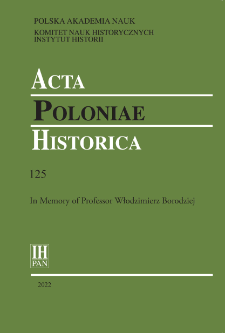- Wyszukaj w całym Repozytorium
- Piśmiennictwo i mapy
- Archeologia
- Baza Młynów
- Nauki przyrodnicze
Wyszukiwanie zaawansowane
Wyszukiwanie zaawansowane
Wyszukiwanie zaawansowane
Wyszukiwanie zaawansowane
Wyszukiwanie zaawansowane

Obiekt
Tytuł: Occupation as Social Practice and Ambiguous Space: The Lives of Ludwik Hirszfeld and Jan Czochralski in Warsaw, 1939–44
Inny tytuł:
Acta Poloniae Historica T. 125 (2022), In Memory of Professor Włodzimierz Borodziej
Twórca instytucjonalny:
Polska Akademia Nauk. Komitet Nauk Historycznych
;
Polska Akademia Nauk, Instytut Historii im. Tadeusza Manteuffla
![]()
Współtwórca:
Instytut Historii Polskiej Akademii Nauk
Wydawca:
Instytut Historii Polskiej Akademii Nauk
Miejsce wydania:
Opis:
Abstrakt:
This article evaluates the situation of two renowned scientists in Poland, namely the microbiologist and serologist Ludwik Hirszfeld (1884–1954), and the metallurgist Jan Czochralski (1885–1953), during the time of the German occupation from 1939–45. Both scientists strove to continue their scientific work even under the conditions of occupation but faced substantially different treatment by the occupiers: Hirszfeld was forced to live in the Warsaw Ghetto, while Czochralski was allowed to stay in his home and work at the former Technical University of Warsaw. The article takes a comparative approach and will analyse the life situation of both scientists. This means looking at the limits of action for both scientists on one side, and on the other, at the room for manoeuvre, which, under the conditions of a brutal occupation, either emerged for the two of them or they actively created.
Bibliografia:
Cain Friedrich, Wissen im Untergrund. Praxis und Politik klandestiner Forschung im besetzten Polen (Tübingen, 2021)
Hansen Imke, Katrin Steffen, and Joachim Tauber (eds), Lebenswelt Ghetto. Alltag und soziales Umfeld während der nationalsozialistischen Verfolgung (Wiesbaden, 2013)
Kohlrausch Martin, Katrin Steffen, and Stefan Wiederkehr (eds), Expert Cultures in Central Eastern Europe. The Internationalisation of Knowledge and the Transformation of Nation States since World War I (Osnabrück, 2010)
Lindenberger Thomas, ‘Eigen-Sinn, Domination and No Resistance’, in Docupedia-Zeitgeschichte, 03.08.2015
Lüdtke Alf, ‘Einleitung: Herrschaft als soziale Praxis’, in id. (ed.), Herrschaft als soziale Praxis. Historische und sozial-anthropologische Studien (Göttingen, 1991), 9–63
Majewski Piotr, Wojna i kultura. Instytucje kultury polskiej w okupacyjnych realiach Generalnego Gubernatorstwa 1939–1945 (Warszawa, 2005)
Steffen Katrin, Blut und Metall. Die transnationalen Wissensräume von Ludwik Hirszfeld und Jan Czochralski im 20. Jahrhundert (Göttingen 2021)
Tomaszewski Paweł, Powrót. Rzecz o Janie Czochralskim (Wrocław, 20212)
Tönsmeyer Tatjana et al., ‘Fighting Hunger, Dealing with Shortage. Everyday Life under Occupation in World War II Europe – An Introduction’, in Tatjana Tönsmeyer, Peter Haslinger, Włodzimierz Borodziej, Stefan Martens, and Irina Sherbakova (eds), Fighting Hunger, Dealing with Shortage: Everyday Life under Occupation in World War II Europe: A Source Edition (Leiden–Boston, 2021)
Tönsmeyer Tatjana, ‘Besatzung als europäische Erfahrungs- und Gesellschaftsgeschichte: Der Holocaust im Kontext des Zweiten Weltkrieges’, in Frank Bajohr and Andrea Löw (eds), Der Holocaust. Ergebnisse und neue Fragen der Forschung (Frankfurt am Main, 2015), 281–98
Czasopismo/Seria/cykl:
Tom:
Strona pocz.:
Strona końc.:
Szczegółowy typ zasobu:
Format:
Identyfikator zasobu:
oai:rcin.org.pl:235869 ; 2450-8462 ; 0001-6829 ; 10.12775/APH.2022.125.05
Źródło:
IH PAN, sygn. A.295/125 Podr. ; IH PAN, sygn. A.296/125 ; kliknij tutaj, żeby przejść
Język:
Prawa:
Licencja Creative Commons Uznanie autorstwa-Bez utworów zależnych 4.0
Zasady wykorzystania:
Zasób chroniony prawem autorskim. [CC BY-ND 4.0 Międzynarodowe] Korzystanie dozwolone zgodnie z licencją Creative Commons Uznanie autorstwa-Bez utworów zależnych 4.0, której pełne postanowienia dostępne są pod adresem: ; -
Digitalizacja:
Instytut Historii Polskiej Akademii Nauk
Lokalizacja oryginału:
Biblioteka Instytutu Historii PAN
Dofinansowane ze środków:
Dostęp:
Kolekcje, do których przypisany jest obiekt:
- Repozytorium Cyfrowe Instytutów Naukowych > Kolekcje Partnerów > Instytut Historii PAN > Czasopisma
- Repozytorium Cyfrowe Instytutów Naukowych > Kolekcje Partnerów > Instytut Historii PAN > Wydawnictwa Instytutu
- Repozytorium Cyfrowe Instytutów Naukowych > Kolekcje Partnerów > Instytut Historii PAN > Wydawnictwa Instytutu > Czasopisma
- Repozytorium Cyfrowe Instytutów Naukowych > Kolekcje Partnerów > Instytut Historii PAN > Wydawnictwa Instytutu > Czasopisma > Acta Poloniae Historica
- Repozytorium Cyfrowe Instytutów Naukowych > Piśmiennictwo > Czasopisma/Artykuły
Data ostatniej modyfikacji:
22 wrz 2023
Data dodania obiektu:
14 sie 2022
Liczba pobrań / odtworzeń:
74
Wszystkie dostępne wersje tego obiektu:
https://rcin.org.pl./publication/272498

 INSTYTUT ARCHEOLOGII I ETNOLOGII POLSKIEJ AKADEMII NAUK
INSTYTUT ARCHEOLOGII I ETNOLOGII POLSKIEJ AKADEMII NAUK
 INSTYTUT BADAŃ LITERACKICH POLSKIEJ AKADEMII NAUK
INSTYTUT BADAŃ LITERACKICH POLSKIEJ AKADEMII NAUK
 INSTYTUT BADAWCZY LEŚNICTWA
INSTYTUT BADAWCZY LEŚNICTWA
 INSTYTUT BIOLOGII DOŚWIADCZALNEJ IM. MARCELEGO NENCKIEGO POLSKIEJ AKADEMII NAUK
INSTYTUT BIOLOGII DOŚWIADCZALNEJ IM. MARCELEGO NENCKIEGO POLSKIEJ AKADEMII NAUK
 INSTYTUT BIOLOGII SSAKÓW POLSKIEJ AKADEMII NAUK
INSTYTUT BIOLOGII SSAKÓW POLSKIEJ AKADEMII NAUK
 INSTYTUT CHEMII FIZYCZNEJ PAN
INSTYTUT CHEMII FIZYCZNEJ PAN
 INSTYTUT CHEMII ORGANICZNEJ PAN
INSTYTUT CHEMII ORGANICZNEJ PAN
 INSTYTUT FILOZOFII I SOCJOLOGII PAN
INSTYTUT FILOZOFII I SOCJOLOGII PAN
 INSTYTUT GEOGRAFII I PRZESTRZENNEGO ZAGOSPODAROWANIA PAN
INSTYTUT GEOGRAFII I PRZESTRZENNEGO ZAGOSPODAROWANIA PAN
 INSTYTUT HISTORII im. TADEUSZA MANTEUFFLA POLSKIEJ AKADEMII NAUK
INSTYTUT HISTORII im. TADEUSZA MANTEUFFLA POLSKIEJ AKADEMII NAUK
 INSTYTUT JĘZYKA POLSKIEGO POLSKIEJ AKADEMII NAUK
INSTYTUT JĘZYKA POLSKIEGO POLSKIEJ AKADEMII NAUK
 INSTYTUT MATEMATYCZNY PAN
INSTYTUT MATEMATYCZNY PAN
 INSTYTUT MEDYCYNY DOŚWIADCZALNEJ I KLINICZNEJ IM.MIROSŁAWA MOSSAKOWSKIEGO POLSKIEJ AKADEMII NAUK
INSTYTUT MEDYCYNY DOŚWIADCZALNEJ I KLINICZNEJ IM.MIROSŁAWA MOSSAKOWSKIEGO POLSKIEJ AKADEMII NAUK
 INSTYTUT PODSTAWOWYCH PROBLEMÓW TECHNIKI PAN
INSTYTUT PODSTAWOWYCH PROBLEMÓW TECHNIKI PAN
 INSTYTUT SLAWISTYKI PAN
INSTYTUT SLAWISTYKI PAN
 SIEĆ BADAWCZA ŁUKASIEWICZ - INSTYTUT TECHNOLOGII MATERIAŁÓW ELEKTRONICZNYCH
SIEĆ BADAWCZA ŁUKASIEWICZ - INSTYTUT TECHNOLOGII MATERIAŁÓW ELEKTRONICZNYCH
 MUZEUM I INSTYTUT ZOOLOGII POLSKIEJ AKADEMII NAUK
MUZEUM I INSTYTUT ZOOLOGII POLSKIEJ AKADEMII NAUK
 INSTYTUT BADAŃ SYSTEMOWYCH PAN
INSTYTUT BADAŃ SYSTEMOWYCH PAN
 INSTYTUT BOTANIKI IM. WŁADYSŁAWA SZAFERA POLSKIEJ AKADEMII NAUK
INSTYTUT BOTANIKI IM. WŁADYSŁAWA SZAFERA POLSKIEJ AKADEMII NAUK


































